It was Winter, early 2015, during a relentless snowstorm in New York. Miraculously, the weather cleared up for a 3 day period, and those happened to be the days that Seth Godin had a workshop in his hometown of Hastings-on-Hudson. While at this gathering I was randomly put into a small group for a break-out exercise where I got to meet a young lady named Kelli. Just by listening to her facilitate an exchange within the group I quickly made the assumption that she had to be a high-dollar consultant or a CEO of a large company. I squinted my eyes to read her name tag (which, by the way, had each person’s name and superpower written on them – GREAT idea) and I was even more intrigued. It said:
I draw monsters.
For those of you familiar with Spider-Man, Peter Parker got bit by a radioactive spider that unleashed his powers. Kelli had a different type of accident, that we go into during the interview, which helped her center herself and sent her on her unique path. Truth is; she is a CEO, consultant & a little bit everything. All tied together with a delightful Canadian accent and a boatload of humility. She’s the real deal.
In 2017, I crossed paths again with Kelli again when I joined altMBA 6. She is now the Provost of the altMBA program, poised to continue to instigate change in the educational space. I talked to Seth about the program in his interview and continued that conversation with Kelli here. Without further a due, let’s sit down and have a conversation with Kelli Wood …
[Setting: I was up in New York for meetings & so that I could attend the altMBA annual gathering on Saturday. Kelli & I decided to meet for the interview at Seth’s office on Friday. After being greeted by Seth, he generously opened up his office so that we could conduct our interview. It was truly generous of them to carve out the time given the daunting task of preparing for the gathering.]
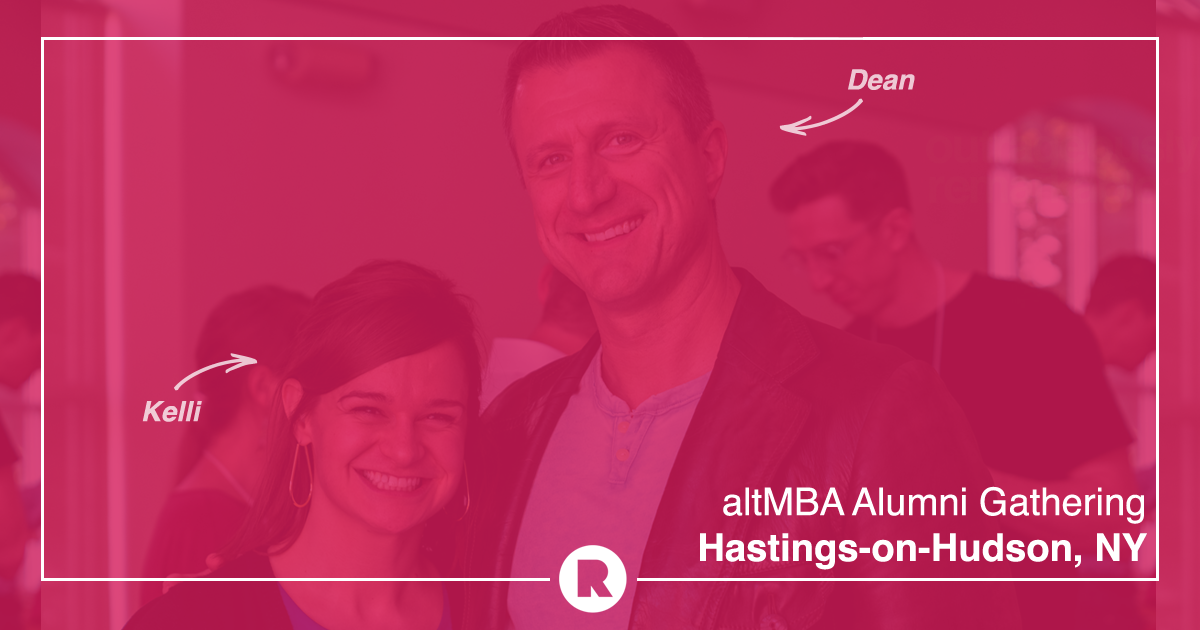
Dean: You draw monsters. How did you start Little Big Words?
Kelli: I started drawing for fun when I was in business school during my undergraduate degree. I drew playfully from time to time … mostly in the margins of my paper when I was stuck at the library or to be honest when I was really bored. Most creative people who go to business school can find it extraordinarily stifling at times, especially if you choose the wrong adventure when you select your electives and find yourself in very linear disciplines that don’t challenge you the way you wish they would.
There’s something also extraordinarily healing and regenerative about the creative process
Even though I could always do the math, there was a large part of me that had a deeply creative side that gave me an infinite amount of fulfillment. Being able to use my imagination made me be able to feel like a kid again. Once I graduated from business school, after a few years of working in advertising and slogging through the notoriously long hours, I was just so burnt out … then when I was 28, I really, really hurt myself while spinning. I herniated two discs in my lower back and all of a sudden, I went from biking an exorbitant number of kilometers a week, to barely being able to walk or move my legs. Suddenly, I had all of this time on my hands and my body was truly asking me to heal and rest. While I’d never taken a drawing class before, one Saturday morning I just decided to practice and taught myself. It started out really small and something only a mother could love. But like anything, with practice, you get better and better. There’s something also extraordinarily healing and regenerative about the creative process, especially when you hit a state of flow. When I need to recover in different ways if I’ve been working a lot for example … creativity or drawing for me is always a place that I can go back to recenter. I definitely did not expect that injury or the excruciating pain and limited mobility … or that I would be out of commission for that long given the severity of it. It was about 18 months of constant physical therapy and chiropractic care and MRIs. It took over two years until I was completely pain-free. So I told myself that I was going to make the time that I had useful and it turns out that I created an entire species and a universe, and a company that my whole heart was in … which was kind of neat.
To this day, Little Big [Words] still stands as a symbol for me of the importance of making the conscious decision to do the best that you can, regardless of the hand that you are dealt.
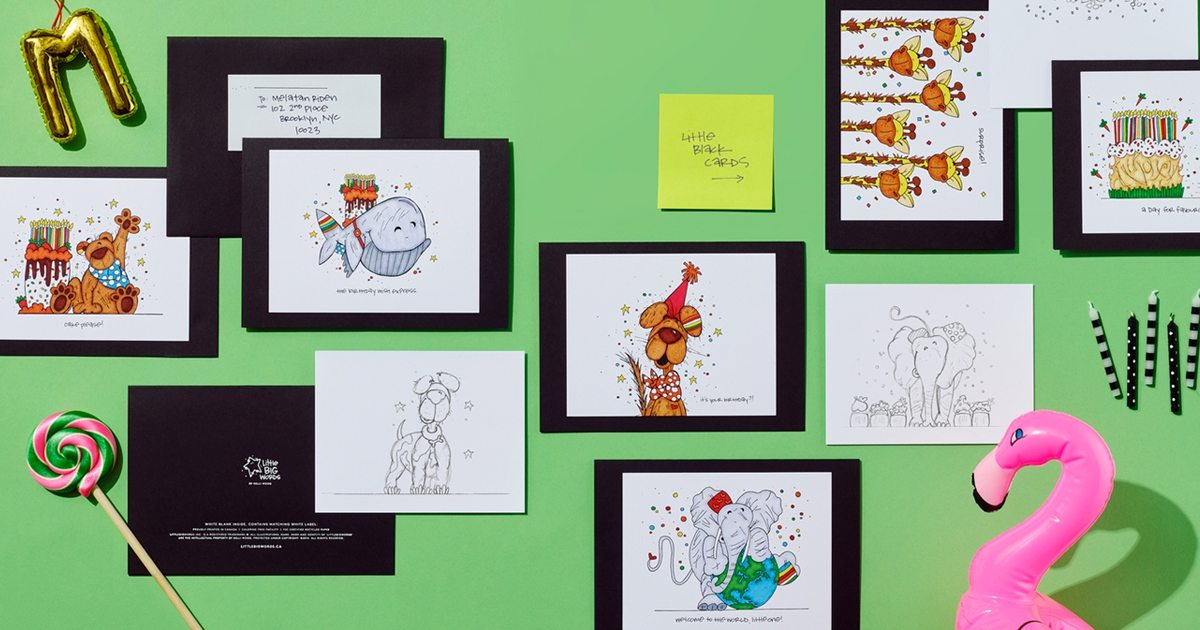
Dean: Did you start off with stationary and cards? What product lines did you start with?
Kelli: Little Big Words was a bit of an accident, to begin with, but not definitely accident once I really got into it. I started out with greeting cards because they were so simple and could be manufactured right down the street in Toronto. Costs were low, so was the risk, and the whole thing could be done in my apartment. Eventually, it evolved into notebooks, notepads, phone cases, laptop covers and we started exploring an entire baby and kids line with a large distributor.
… have an in-your-bones rooted confidence.
I think one of the questions that you asked me about earlier [when we were chatting] was, ‘What’s one piece of advice that you would give somebody for their career?’
Without question, I highly recommend that everyone becomes an entrepreneur once in their life, even if it’s just on a small scale. I learned more being a small business person than I did in four years of business school. I learned how to sell, how to market, I taught myself the entire Adobe Creative Suite and how to design. I learned about intellectual property, cash flow management, UX/UI design and e-commerce, taxes, exchange, distribution, business models, operations, licensing rights, contract negotiation, you name it. That school of street smarts about how to truly build a business from scratch sharpens you like a knife. By the time that you’re done, you are a fundamentally different person. You’re someone who is extraordinarily resilient and have an in-your-bones rooted confidence. You know who you are after you walk away from it both on your best day and your worst day. I looked at how much I paid for my business school education and I contrasted that to what a graduate school program would cost. At the time, I thought, why don’t I take some of my savings and teach myself the street smarts that I truly seek that aren’t in a textbook and pick the simplest business model that I could, just to get started … that’s definitely not how I thought I would get my start, but it was probably one of the smartest things that I’ve ever done and the most transformative thing that I’ve ever done that changed me in really important ways.

Dean: I think millennials are listening to you [right now]. I just read an article about how many millennials have an entrepreneurial side hustle. That show that you went to, was that when you realized that you had something?
Kelli: Great question. Actually no … my first big sale was to a children’s dentist. Part of their marketing strategy was to send a birthday card to each one of their patients. As it turned out, they had over 5000 of them. Who knew? The One of Kind Show really was where my inner artist could find freedom and legitimacy, and the customer base wanted to support local Canadian artists – so it was the perfect launchpad for someone like me. The show is one of the largest consumer shows in North America, and several successful Canadian Startups have kicked off their business there with incredible results and consumer loyalty. But the show was important more from a design perspective … as it gave me the opportunity to create a free-standing, branded retail space, which made it easy for buyers to see how my product could sit in their environment.
… I no longer needed a resume.
I think the millennial dream is even bigger than entrepreneurship, I think it’s really about the idea of freedom and the open pursuit of passion and living a life that you love. For the millennial readers … the most important thing that Little Big represents to me and will always be … similar to the way that Seth has writing and his blog is that that, Little Big is my voice … it’s Kelli. Every creative person needs to have something that the rest of the world can’t have, where no client can tell you that it shouldn’t be Pantone 185C or the ask to make their logo just a little bit bigger. And bigger. And bigger. I started Little Big for a couple of reasons … and none of them had anything to do with me wanting to start a greeting card business. Part of it was about learning about business, but a larger part of it was about pure imagination and the exploration of creativity.
But, in the end … what it became … was that I no longer needed a resume. It was a vehicle where I created something so much bigger than myself that sent a signal to the market about who I was, and what I was capable of. And it completely differentiated me from the pack. While everyone else was submitting their resume on an 8.5 x 11” piece of paper … I had an interactive world online that also demonstrated my values, work ethic, and business skills.
Dean: So my two cents, and I could be totally off, but the one thing that I didn’t see in your shop that I would recommend is coloring books.
Kelli: Ha! You’re not alone there. My Mom wants them too. But truth be told, the running inside joke with my friends has always been to completely take over the Ikea kids department with my monsters. Can you imagine the printed bedsheets? The monster rugs?! In blue, in red, in green, with polka dots and stripes and …
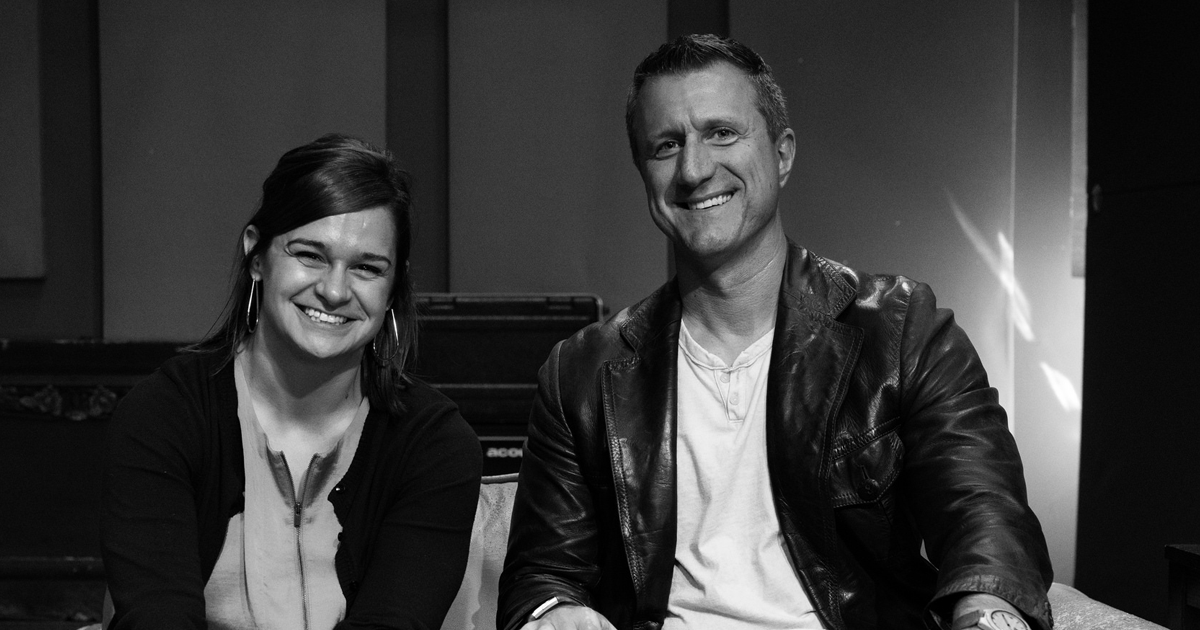
Dean: Well if I had the opportunity, I would totally license it as a coloring book for our customers. So currently, you’re the Provost of altMBA. What’s that like?
Kelli: Infinite. It’s truly infinite. It’s an extraordinary privilege to work and learn from Seth, to begin with. He’s one of the thinkers in the world that I admire the most, and I’ve read his work for well over a decade. I often look at him, his courage and audacity to make an assertion about how education should be … and just the depth and breadth, knowledge and critical thinking that you’d need to create something like this. There are very few people in the world who could create what he has and think in the way that he does. And then add to that, the tenacity to make it happen.
On a more practical side … it’s also the internet. So let’s be honest … my days are seldom dull…. every single day is different, and it moves exceptionally fast. When you’re on the cutting edge of innovation that’s disrupting the educational system and learning as we know it globally … you have to stand right on the edge with all of your fearlessness and humility and shine.
… it literally bursts at the digital seams with possibility and potential.
Dean: When you say infinite, do you mean the perpetual game?
Kelli: I’m not sure if you’ve read the book Finite and Infinite Games by James P. Carse. Carse helps us understand that there’s a distinction – in a finite game, there’s a time limit, scarcity and there is a winner. So soccer and chess are finite games. And as Seth would say, since industrialization, we’ve turned just about everything we can into a finite game. Even social media, the contest to see how many likes you can win. In the infinite game, we’re not playing to win (and to have others lose), we’re playing to play. Like playing catch with your Dad. That’s the infinite game.
I have a track record and filter for perpetually signing up for projects that feel like the infinite game for me. The part of altMBA that is my core responsibility is to define, shape and change is how people work together, how people learn, how students lead, how they’re able to interact with one another … and how to inspire them to become the best version of themselves as a leader or a human. The global diversity of the program, with students from over 80 countries and how they work together … is absolutely unbelievable. I can only imagine what would happen if world leaders could speak to one another the way our students do. The conversation that happens in that program about ideas, about respect, the teamwork … and with such generosity … it literally bursts at the digital seams with possibility and potential. It’s hard not see the way that the world could be on its best day when you’re in the workshop, but I have the privilege to, every day. There’s no place like it, it’s an extraordinary thing and an unparalleled community, especially on the Coaches Team, which is truly a phenomenon all on its own.
Dean: I’m going to put you on the spot a little, is there an example of a student who exemplifies how the program can impact one person?
… leveraged every single tool in altMBA …
Kelli: Adam Braun, the Founder of Pencils of Promise enrolled in altMBA last year. He’s a phenomenal example of someone who used altMBA as engine and catalyst to start his second venture, MissionU … an alternative education method to help students in the United States offset the crippling issue of financial debt from education. He saw the change that he wanted to make in the world and leveraged every single tool in altMBA to solve a real market problem and went at it with full abandon to bring it to life to make it happen.
And he did … he’s now partnered with Gary Vaynerchuk, Spotify, UBER, Bonobos, Warby Parker. It’s amazing.
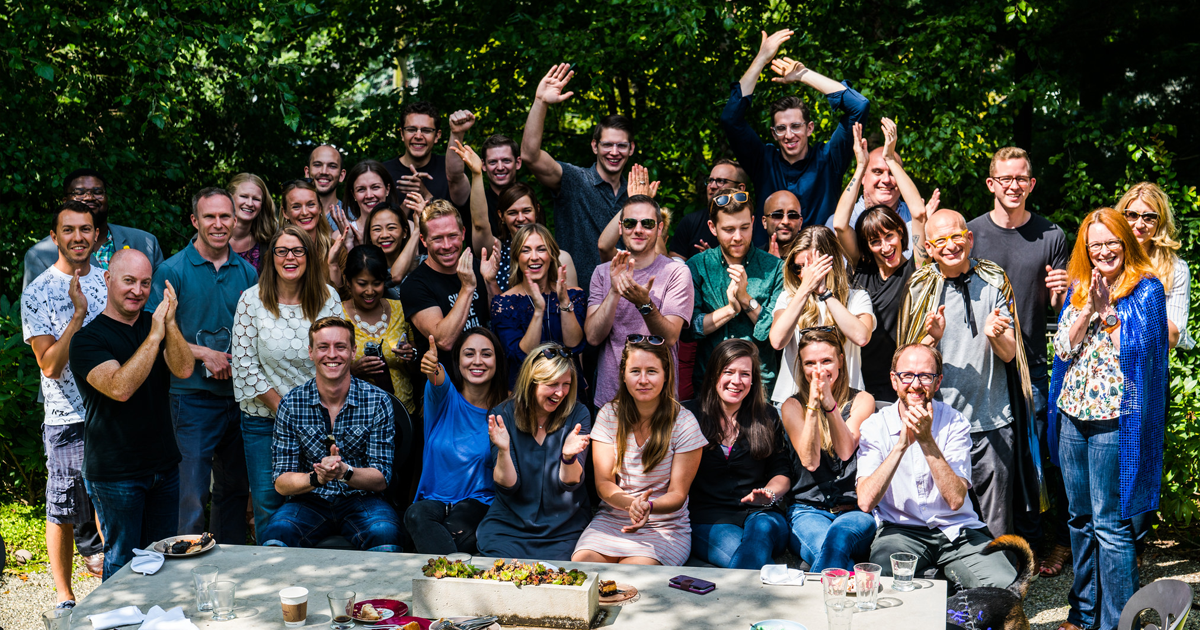
Dean: What’s the biggest takeaway that traditional education could borrow from altMBA that would change everything?
Kelli: You really have to dig into the history of education and understand what education was originally built for first. Seth’s talk, ‘What Is School For’ TED Talk from Brooklyn, I highly recommend as a place to start … I remember watching him present his thesis and that and it was why I signed up for altMBA.
That talk would change everything.
If I had to pick one thing though, it’s the abandonment standardized test, and using it as a measuring tool for human potential, capability and the framing of it as a tool that defines someone’s worth.
Dean: How does somebody know that the altMBA is not for them?
Kelli: It’s not the place for someone who doesn’t want change. When students ask us how they can prepare, we usually say, ‘bring an open mind.’ People change a lot of things as they go through the program. Sometimes its the way they think, for others … it’s the work they do. But what always changes, are the student themselves Guaranteed.
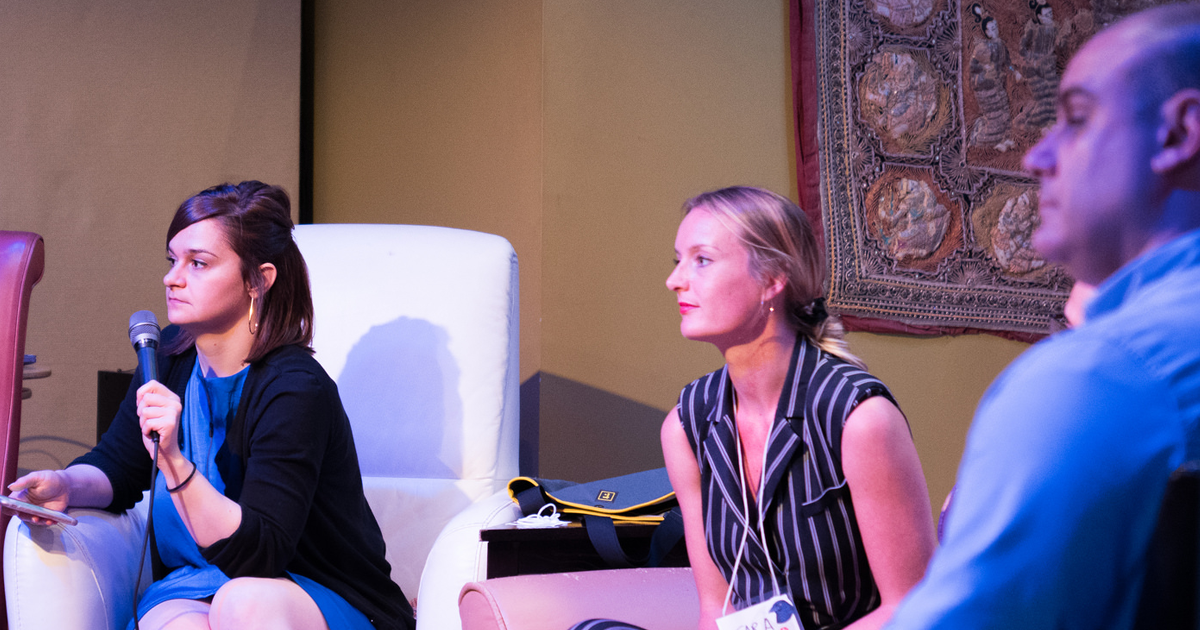
Dean: Okay, I have some Kelli questions. If you weren’t drawing monsters or immersed in the altMBA universe, what would you be doing professionally today?
Kelli: Well, when I heard that Daniel Craig was considering not returning as 007 … [Kelli smiles]… I really have a strong sense of responsibility as a human being and working on behalf of the greater good. I had a life-changing trip to Central America that was a huge awakening for me. I went down there and at the time, I was working in advertising probably about 70-80 hours a week. A friend of mine said that she was going down to Costa Rica and invited me along. I lived completely off the grid, fully vegetarian, no digital exposure, right in the middle of the rainforest. I practiced yoga about 4.5 hours a day and I watched one of the most amazing things that I’ve ever seen in my life … a thunderstorm comes across the Pacific Ocean while we were on a mountaintop. Hearing the monkeys cry when the rain would start to fall and the way that the clouds broke apart with lightning. After that, I came home just … different.
Rising global temperatures mean a lot of things.
By the time that I got through Canadian customs, I realized that I wasn’t okay with the fact that in advertising that I make people believe that they need something in order to be something. And that’s the entire crux of what advertising does in some of the product categories that I was working in at the time. Mindless consumption. When I left my job, I didn’t just leave my job … I left advertising. Now, given how much that I’ve seen and know, I wholeheartedly feel my responsibility for being a human and the impact on the planet. Watching what Costa Rica has done as a nation with science, how they can go for months relying only on hydropower and not burning fossil fuels, and an absolute and unconditional emissions reduction target to climate change is amazing. Whether that means that I would go work for Canadian Intelligence or work on climate change, I don’t know… we have so much work to do there. The science is unequivocal, and its a race against the clock. Rising global temperatures mean a lot of things. That means greater international security issues… populations are going to move, disaster recovery efforts are only going to intensify. I love working with people and seem to be able to organize them and unite them. And it’s a skill that I could use in service to humanity to help us navigate through what’s to come, especially if we don’t start really figuring out and making big strides within the next decade.
Drawing monsters, though … there will always be time for that.
Dean: We’re in a pretty remarkable person’s office right now, so we’ll say other than Seth [who I drip to my readers as a steady diet:) ], who is the most remarkable person that you’ve ever met and why?
Kelli: I can’t wake up in the morning and not have a huge amount of respect and level of awe for that man. For his intelligence and his character, his discipline and commitment … his blog and books are phenomenal, but the reason why I fundamentally respect him is because of who he is as a human being and how much that he gives to so many people.
“Okay. What happens if we pretend that this isn’t really, really hard?”
Aside from Seth though … the most remarkable person that I know is my teammate here at altMBA, Marie Schacht. She’s an alumnus of altMBA, and I hired her as a coach to start on my team a little over a year ago. Over time, we’ve grown both in our roles and together and have one of the coolest, most creative and collaborative working partnerships that I’ve had in my career. I hired her based on my ‘Joe Biden’ philosophy. I stole a page out of Barack Obama’s playbook when he hired Joe … and asked the question ‘Who could I surround myself with that in the hardest of circumstances … that they would inspire me to be the best possible human being I could be?’ Marie is my Joe and I often call her that. She is someone who represents all of the values of why I do the work that I do, why I commit the way I do, and she inspires me endlessly. Everyone has defaults, habits, bad days or tough losses, but she always helps me refocus with positive intent in our little digital office. She’s one of the kindest, most compassionate, down-to-earth human beings that I’ve met and she’s an architect by trade … so working with her, and the rare balance of her EQ/IQ and her design mind is absolutely fascinating.
Because altMBA is so new, and there’s nothing else like it – we definitely make up a lot of things as we go. We often joke that it’s like we’re the first explorers, on an adventure … trying to make our way across Antarctica. While I’ve learned endless things from her, here’s one of my favorites… One time we were in the weeds, working on something and she said, “Okay. What happens if we pretend that this isn’t really, really hard?” Game changer. It changes your frame and your entire emotional ability to make a decision. She also serves as a mirror.
I will say to her, “I’m about to make a hard decision, I’m about to do something challenging, can you be my mirror and be my second check about whether we’re doing the right thing and I’m not missing anything?” Not just ‘are we doing the right thing,’ but is this what success truly looks like? Are we making someone feel respected, cared for, and seen? Are we making decisions that we stand behind and are proud of, even if they’re hard in the moment?
So, she’s my Joe Biden and she’s the person that in the hardest of circumstances, you want to have in the room to be a voice of reason, one of stability, a voice of structure. Any good leader knows that when you have someone like that and you let them in, your decisions are inherently better. it helps me every day to always have a true north, and for me, even though I’m Provost, I truly work for her. As a human, she’s someone that I deeply admire and respect and want her to be proud of the work that we do.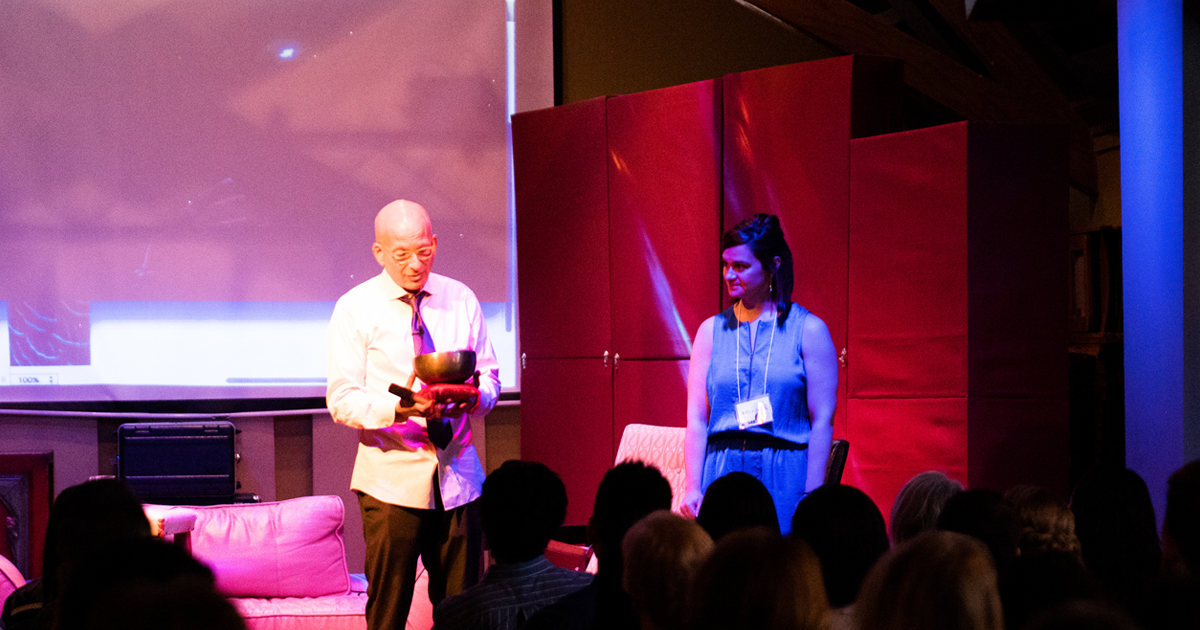
Dean: What’s something true about you that most people wouldn’t believe?
Kelli: That I’m just figuring it out. Just like the rest of us.
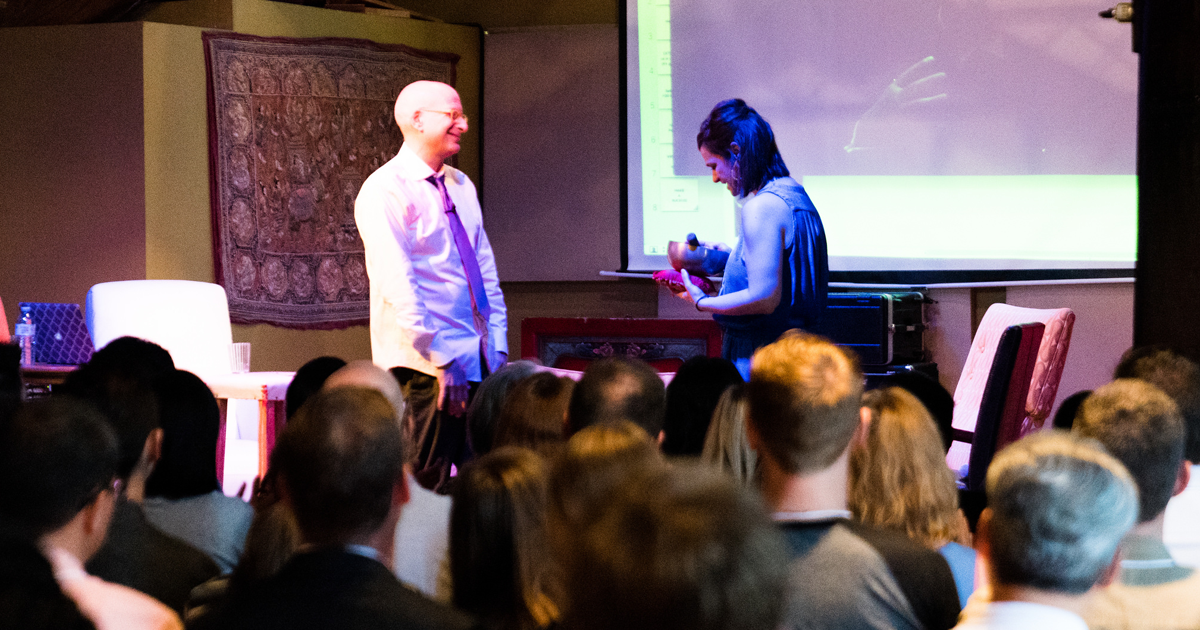
Dean: I had an exchange with Tom Peters via Twitter not long ago and I made the assertion that the people that are ‘making it up as they go’ along are either totally clueless or are on the cutting edge. Obviously, you’re on the cutting edge, so there’s a bit of figuring it out and kind of experimenting and I can see that it goes [contrary] to the point that many people look to a leader to have all the answers …
Kelli: Well, there are truly no ‘right answers’ … but there are really smart ways that with collective intelligence and teamwork with people that you trust … you can build the answers that are right for you, your culture, your business or your team. I think a lot of organizations and leaders get too bent on their ego, and that their title carries their weight, their value, and authority on a business card. That’s not power. That’s posture.
Make a mistake, and you could lose your best people.
Everything changes when you choose to work alongside your team. As a leader, in my worldview anyway … you want to have a team that’s inspired to stand right beside you … not one that you stand in front of. Where leaders can get into trouble is when they make those decisions in isolation, and emotion can pull too hard in your process. You have to make decisions with your team as a collective, especially when you have a company, or a really strong work culture that you want to protect. Make a mistake, and you could lose your best people.
As a team, we take the time to explore the edges of the problem and the narratives surrounding the issue and ask, ‘’Is this the kind of example that we want to set?’ ‘Would people like us, believe in something like this?’ ‘Is this work that we’re proud of?’ Jimmy Iovine, Apple’s Top Music Executive, taught me that ‘the second that you stop listening, is the second you stop leading.’ You’re not making it up if you take the time to build decisions that lead to answers with your team and they’re ones that they believe in it too.
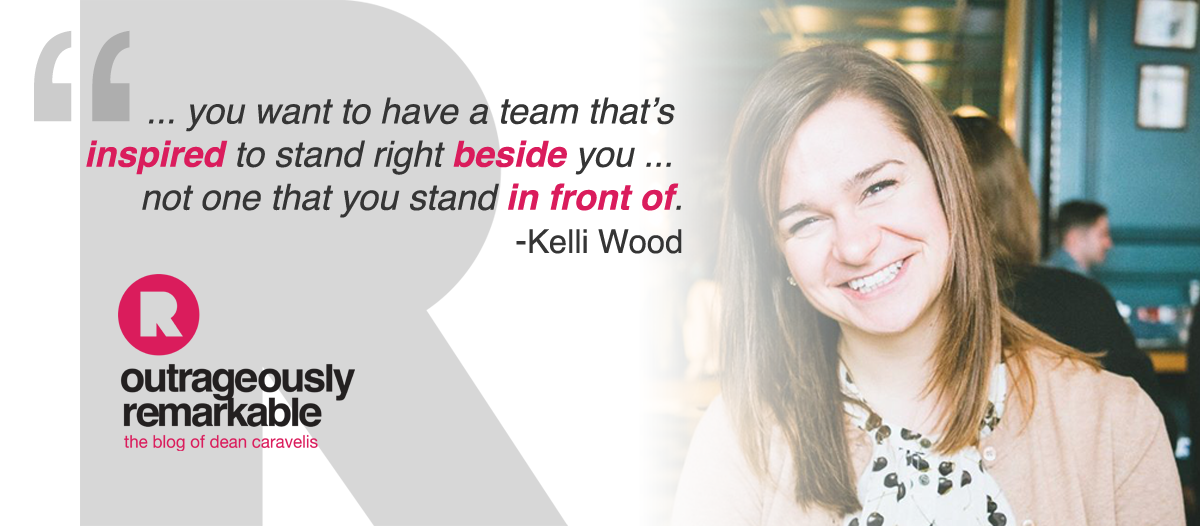
Dean: If you could put the humility aside for a little bit, what is your secret to being outrageous remarkable?
Kelli: The secret is, it’s not a secret. It’s a decision that everyone can make. And you don’t choose to do it. You decide to do it. You decide that it’s who you want to be. When you think of the work that you do, so much of the work that actually matters to other people has absolutely nothing to do with what’s listed in your job description. That’s not how they remember you. They remember you for who you are, how you made them feel, a difference that you made for them, a space that you created or held for them.
One of my favorite quotes from Seth comes from a post called, Soles.’ This has been not my secret, but my roadmap to it since January 2011:
‘All that any of us have are the memories and expectations and changes we’ve left with others. It’s so easy to get hung up on the itinerary, the features, the details and the specs … but that’s not real, it’s actually pretty fuzzy stuff. The concrete impact of our lives is the mark you make on other people. It might be a product that you make or the way you look someone in the eye. It might be a powerful experience you have on a trip with your Dad or the way you keep a promise.The experiences you create are the moments that define you. We’ll miss you when you’re gone because we will always remember the mark that you made on us. There’s a sign on most squash courts encouraging players to wear only sneakers with non-marking soles. I’m not sure there’s such a thing. If you’re going to do anything worthy, you’re going to leave a mark.’
Thank you, Kelli. Your words on leadership inspire me. I’ll definitely be coming back to this interview throughout the year.
____________________________
Connect with & learn more about Kelli here. If you’re interested in the altMBA program click here.
Big thanks to Paul Jun & Maya Lim for the additional pics – and to Seth Godin for the hospitality during the weekend.
Can I send you an e-mail when my next interview posts? Subscribe here to be an insider
